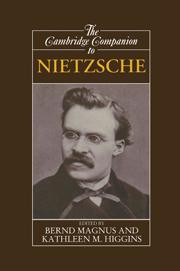Book contents
- Frontmatter
- Introduction to the Cambridge companion to Nietzsche
- Part I Introduction to Nietzsche's works
- Part II The use and abuse of Nietzsche's life and works
- Part III Nietzsche as philosopher
- 5 Nietzsche's kind of philosophy
- 6 Nietzsche ad hominem
- 7 Nietzsche, modernity, aestheticism
- 8 Nietzsche's alleged farewell
- Part IV Nietzsche's influence
- Selected bibliography
- Index
5 - Nietzsche's kind of philosophy
from Part III - Nietzsche as philosopher
Published online by Cambridge University Press: 28 May 2006
- Frontmatter
- Introduction to the Cambridge companion to Nietzsche
- Part I Introduction to Nietzsche's works
- Part II The use and abuse of Nietzsche's life and works
- Part III Nietzsche as philosopher
- 5 Nietzsche's kind of philosophy
- 6 Nietzsche ad hominem
- 7 Nietzsche, modernity, aestheticism
- 8 Nietzsche's alleged farewell
- Part IV Nietzsche's influence
- Selected bibliography
- Index
Summary
That I still cleave to the ideas that I take up again in the present treatises today . . ., that they have become in the meantime more and more firmly attached to one another, indeed intertwined and interlaced with one another, strengthens my joyful assurance that they might have arisen in me from the first not as isolated, capricious, or sporadic things but from a common root, from a fundamental will of knowledge, pointing imperiously into the depths, speaking more and more precisely, demanding greater and greater precision. For this alone is fitting for a philosopher. (GM, P:2)
A certain amount of historical and philological schooling, together with an inborn fastidiousness of taste in respect to psychological questions in general, soon transformed my problem into another one: under what conditions did man devise these value judgments good and evil? And what value do they themselves possess! Have they hitherto hindered or furthered human prosperity? . . .
Thereupon I discovered and ventured diverse answers . . .; I departmentalized my problem,- out of my answers there grew new questions, inquiries, conjectures, probabilities - until at length I had a country of my own. . . . Oh how fortunate we are, we men of knowledge, provided only that we know how to keep silent long enough! (GM, P:3)
The Nietzsche speaking here is the Nietzsche of 1887 - vintage Nietzsche, by any reckoning, commenting on the thinking that led up to On the Genealogy of Morals. In these passages and this whole Preface, one will find much that is of interest and importance in connection with the question of Nietzsche's kind of philosophy. The same is true of the other prefaces he supplied to his earlier and subsequent works (and, of course, of his post-Zarathustra works themselves).
- Type
- Chapter
- Information
- The Cambridge Companion to Nietzsche , pp. 151 - 179Publisher: Cambridge University PressPrint publication year: 1996
- 5
- Cited by



